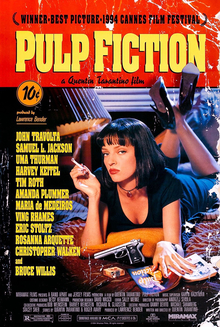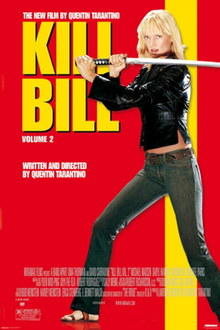 |
| photo by Gage Skidmore |
A year ago I saw Once Upon a Time... in Hollywood. At the time I gave it a better than average review, but I was not terribly impressed. And yet for days afterwards, the movie stayed with me. When it came out on Blu-Ray, I bought it immediately and I have re-watched it several times since.
To be honest, I had trouble understanding why. My original critique of the movie as being meandering and lacking in a tight plot still stands. And yet it lingers. In fact, that is the case for a great deal of Tarantino's films. I personally do not think Pulp Fiction is a very good movie, but for some reason I watch it at least once a year. I think Reservoir Dogs is genius and I enjoy Kill Bill, Django Unchained, and Inglorious Basterds. I think most of his movies have sever flaws, but something keeps bringing me back.
Particularly when thinking about Once Upon a Time... in Hollywood I think I may have an answer, even if it is not THE answer:
It is the masculine genius of Quentin Tarantino
I think one of the keys to understanding the enduring appeal of his movies is the the unfiltered, potent masculinity found there. He fills his movies with men who are truly manly men: alpha males and men of action who are decisive and strong.
This is not to say that all of his portrayals of masculinity are positive. In order to understand the appeal, you have to understand that it is the masculinity that is appealing, not necessarily the vices that accompany them. Michael Corleone, Tony Montana, and Walter White are all evil men and the stories about them make the tragedy of the horrible moral choices very clear. And yet, you cannot deny that there is a significant portion of the male population that finds something very appealing and cool about them. You could chalk this up to the concupiscent desire for evil in fallen man. But I think that is too simple. These men are not admired because they are evil. They are admired because they are masculine.
Part of Tarantino's genius is that he knows that masculinity in and of itself is not a moral good. The same manly attributes can be used to make someone a hero or a villain. Masculinity is portrayed in both its admirable and toxic forms in his movies.
SPOILERS FOR QUENTIN TARANTINO FILMS

His first movie, Reservoir Dogs is filled with alpha males. This is exemplified when they get their names and Joe Cabot says, "No way, no way. Tried it once, it doesn't work. You get four guys all fighting over who's gonna be Mr. Black, but they don't know each other, so nobody wants to back down. No way. I pick. " There is not a high level of agreeableness among them because they each have very strong opinions and are not shy. The opening scene is a wonderful example of the kind of un-refined dialogue that often happens when guys are alone without the civilizing effect of the feminine. Their masculinity is not uniform. Mr. Pink is not physically intimidating, but his brain is a sharp weapon. Mr. Blonde is a brute. Mr. White is fiercely and violently loyal. Mr. Orange is patiently endures death to fulfill his duty.
Again, these men are not saints because they are manly. Mr. Pink is a coward. Mr. Blonde is a psychopath. Mr. White is a cold-blooded killer. And Mr. Orange is a liar who lacks compassion for his fellow officer. We don't want to be these men in their totality of virtue and vice. But, as men, we would hope to be as witty as Mr. Pink, as strong as Mr. Blonde, as brave loyal as Mr. White, and as brave as Mr. Orange. We may be able to console ourselves in that we would not be murderers, but could we stand by a friend in the face of death?

Pulp Fiction gives us protagonists who are also incredibly manly. Vincent and Jules are wicked killers. But when they enter into a room, they command the attention. Jules is particularly cruel in inflicting great fear into those he is about to kill. And yet, this moral wreck of a man begins a turn away from his life of crime. In doing so, he does not become less manly. His decision is based on a resolute and decisive choice to accept God's presence in saving his life. He even holds to this in the face of ridicule. And when he faces down Ringo in the coffee shop, he shows great strength of will against his evil nature as he says "I'm tryin' real hard to be the shepherd." I have serious doubts about if his conversion will be successful, as there is still too much self-centered willfulness in his attitude. But makes his choice as a free man.
Vincent's big dilemma is not spiritual, but relational. As he finds himself attracted to his boss's wife, he struggles with attraction versus loyalty. He even has a rather vulgar conversation with himself reminding him that a man keeps faith even if his desires are opposite. But it is also Vincent's machismo that gets him killed. For no reason, he stares down Butch in the night club. For some reason he felt the need to try and dominate the boxer in that moment. But that lingering resentment got him killed when he came out of the bathroom later in Butch's apartment.
Strangely, you can see the masculine genius at work the best in the story of Butch and Marsellus. As the story "The Gold Watch" begins, Captain Koons tells the young Butch about how he was a POW with Butch's father. He says that when you go through something like that with another man, you take on certain responsibilities. As an adult, Butch betrays mob-boss Marsellus, who then puts a hit out on Butch's life. The two end up running into each other, but through a strange twist of fate, Butch and Marsellus are captured by rapists, who take Marsellus away to assault him. Butch escapes his bonds during this time and he has a chance to escape. But as he goes to leave the man who wants him dead to this horrible fate, he stops and decides to save him.
Tarantino understands the horror that Butch has at what Marsellus is enduring. Butch returns to save Marsellus not because he has feelings of friendship for for Marsellus or because he thinks it will result in a reconciliation. He does it because he has a responsibility towards him because of their common imprisonment. Marsellus understands what Butch does for him and now understands his own debt to him that must be repaid. There is zero affection between them and neither of them leave necessarily more virtuous. But they both stepped up to the unwritten obligations before them.

Kill Bill is more of an exploration of strong women, but the character of Bill and his brother Bud show strong masculine traits. Bud is a disgusting loser, but he does not try to equivocate his responsibility, acknowledging his guilt and the justice of his enemy's vendetta. When Bill dies, he stands up straight, buttons his coat, and boldly takes the five steps that will explode his heart. Tarantino never lets these men off the hook and their fates are deserved.

Django lives up to the masculine fantasy of being able to do great violence to anyone in order to rescue the woman in his life. Every man, even if he would never actually do it, secretly hopes that they have it within them to take on any enemy and defeat them to save their wife or daughter. Dr. King Schultz even accompanies him on this difficult quest simply because they are friends and he understands that it is Django's duty as a husband to do anything to save his wife.

Lt. Aldo Raine in Inglorious Basterds is a cold-hearted brute. There doesn't seem to be an ounce of softness in him. He isn't stupid, but he is utterly simple, without any complication in him. When the brilliant and evil Hans Landa has Aldo captured, they have this exchange:
Lt. Aldo Raine: How you know our names?
Col. Hans Landa: Lieutenant Aldo, if you don't think I wouldn't interrogate every single one of your swastika-marked survivors... We simply aren't operating on the level of mutual respect I assumed.
Lt. Aldo Raine: No, I guess not.
Aldo does not have any complexity which makes him a man of complete and total action. He can decisively commit to his course of action without looking back. Most men try to be this decisive. That isn't to say that this quality isn't easily corrupted into pride and stubbornness. You get the distinct suspicion that Aldo could easily unleash his violence on a less deserving enemy. But there is a strong desire to be able to choose and hold a course of action.

Finally, in Once Upon a Time... in Hollywood, you have two protagonists that are so different and yet are intensely masculine. With Cliff Booth, his manliness is obvious in his strength, determination, and decisiveness. He says to Squeaky Fromme that he's going to check on his old friend George and that nothing is going to stop him.
Rick is much different, as he is much more outwardly emotional. But he is still hyper-masculine. You can see he takes his job as an actor very seriously by the way he works at memorizing his lines. When he screws up, he is so humiliated because he appears as though he hasn't been taking his responsibilities seriously. While he is horribly insecure, he never stops trying to find his level and do a good job. You get the strong sense that for him it isn't merely a matter of fame, but that intensely masculine desire to do your job well because your identity, rightly or wrongly, is tied to your job.
But for me, the best moment, the one I watch repeatedly, is a simple one. Rick asks Cliff if he wants to come in and watch his show that is going to be on TV. Cliff says "I figured we would. I got a six-pack in the back and I thought we'd order a pizza."
It is a simple scene, but in that small moment, it captured something about manly friendship. Someone once said that your best friends are not those you see as your equals, but as your betters. Rick is a little nervous at asking if Rick will want to hang out with him. But Cliff simply enjoy's Rick's company and planned on hanging out anyway. Even though Rick has money and stardom, Cliff doesn't ahve a drop of envy. In other words, their friendship has closeness and loyalty, but no drama. This in many ways is an ideal masculine friendship.
There is much more that can be written on this subject. There is indeed plenty of room to critique his portrayls of men. Tarantino's portrayl and treatment of women in his films is also a subject about which much can be written. But we will leave these considerations for later.
Tarantino gives us manly men in his movies. He not judge them for being masculine, nor does he sanctify them for being manly.
But in either case, you can say of each of the main characters discussed have something in common. Whether he is a good man or bad man, there is no question that he is a man.
No comments:
Post a Comment